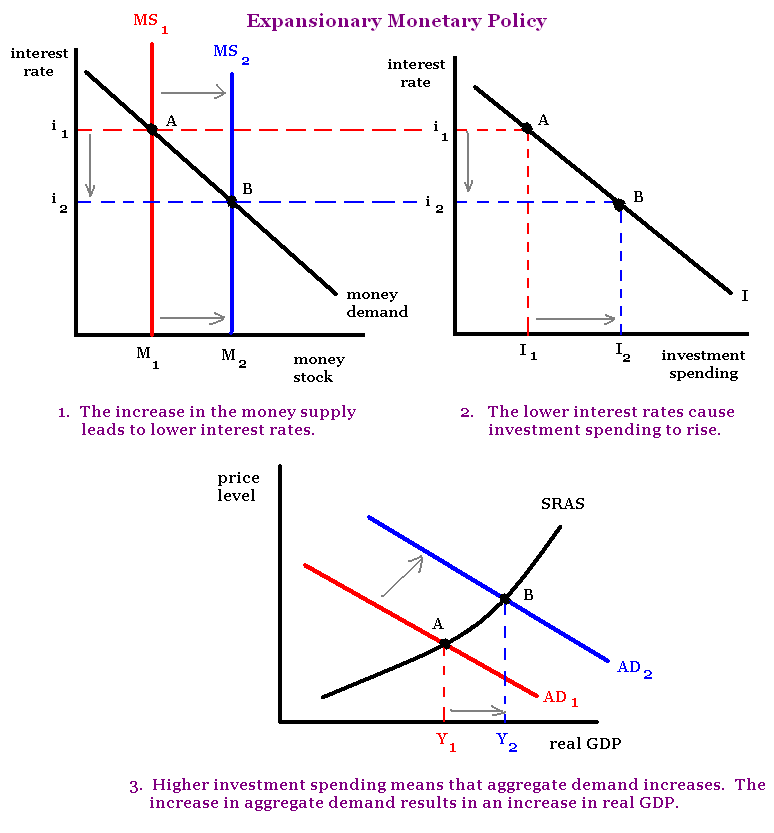Monetary Policy
Post on: 31 Март, 2015 No Comment

The alternative (and/or complement) to fiscal policy is monetary policy. This is set by the Federal Reserve Board. The economic logic is similar—put money in or take money out—but the tools are different. 
During a recession, the Fed can stimulate growth by lowering the interest rate. People are more willing to make a major purchase when they can borrow money at 5%, rather than 7%. The Fed can also put more money into circulation by lowering the amount they require banks to keep on hand to cover daily transactions. By lowering these minimum reserve requirements, the Fed encourages banks to lend out more money to consumers and investors. Finally, the Fed can inject money by buying bonds in the bond market—through these “open market operations” the Fed uses Federal Reserve funds to buy up government securities.
Monetary Policy Options
To Fight Recession:
- Lower interest rates
- Lower reserve requirements
- Buy securities
To Fight Inflation:
- Raise interest rates
- Raise reserve requirements
- Sell securities
Most politicians prefer monetary to fiscal policy. For starters, it shifts responsibility from them to the Fed—an independent board of bankers and economists. During periods of inflation, this can be particularly attractive. Since the goal during inflation is to remove money from circulation, the fiscal policy response of increasing taxes and/or cutting government spending is not very popular with voters. In addition, some argue that business leaders and consumers are better equipped to manage the money that is injected into the economy during period of recession. Even though a government institution—the Fed—makes the decision to lower interest rates, private borrowers (businesses and consumers) actually decide where and how to spend that money.
Fiscal policy supporters argue, on the other hand, that the government needs to direct the benefits of the cash being injected into the economy to ensure that the sectors of the economy and population most in need receive immediate help. More fundamentally, elected officials often find themselves at odds with the Fed over policy priorities. The members of the Federal Reserve Board are often less politically sensitive—they do not need to get elected. Therefore, their assessment of conditions can differ from that of congressmen and the president anxious to retain public support. More specifically, the Fed tends to be more sensitive than elected officials to signs of inflation, and more ready to impose tight money policies aimed at slowing the economic growth that politicians are anxious to stimulate.
So that’s it—those are the basics. What kind of job do you think you’d do if you were in the Oval Office during hard economic times.  Play our Economic Policy Game to find out.
Why It Matters Today
The prime interest rate is the Federal Reserve’s simplest tool for influencing the economy.  If the Fed worries that the economy is slipping into recession, it lowers the prime rate to encourage growth; if the Fed worries that the economy is overheating and may create inflation, it raises the prime rate to slow things down.
That may all sound pretty academic.  But it impacts you in profound ways.
The prime rate influences the interest rate charged on every other kind of loan.  Are you going to college? (Hopefully your answer is yes!)  You’ll probably have to take out student loans.  If the Fed happens to be fighting inflation at the time by boosting the prime rate, the interest you have to pay on your student loan is going to skyrocket accordingly; it could cost you thousands and thousands of dollars by the time you pay it off.
On the other hand, a very low prime rate causes problems of its own.  If the prime rate drops near zero (like it has recently), the interest paid out on, say, a savings account will also drop toward nothing.  Your money will basically stop earning anything, which would encourage you either to not save at all or to make riskier investments in hopes of earning better returns.  Either of those scenarios could turn out badly.
Long story short: the Fed can impact your life in profound ways.  You might want to start paying attention to what it’s doing!
Sometimes, a Song Says it Better: Mo Money Mo Problems, by Notorious Big
According to Notorious Big, “the more money we come across, the more problems we see.”














